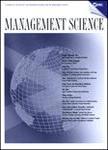-
作者:Andradottir, S
作者单位:University of Wisconsin System; University of Wisconsin Madison
摘要:We present a general framework for applying simulation to optimize the behavior of discrete event systems. Our approach involves modeling the discrete event system under study as a general state space Markov chain whose distribution depends on the decision parameters. We then show how simulation and the likelihood ratio method can be used to evaluate the performance measure of interest and its gradient, and we present conditions that guarantee that the Robbins-Monro stochastic approximation al...
-
作者:Damanpour, F
摘要:Current research in organizational innovation is extensive, yet, because of limitations in scope, most studies are not adequately encompassing. These studies typically relate organizational variables to innovation and control at most for the effect of one contingency factor. Because innovation depends upon a complex host of factors, such theories have limited predictive application. This study intends to develop and test theories that explain the variation in the organizational complexity-inno...
-
作者:Ho, TH; Weigelt, K
作者单位:University of Pennsylvania
摘要:We consider several coordination games with multiple equilibria each of which is a different division of a fixed pie. Laboratory experiments are conducted to address whether ''task complexity'' affects the selection of equilibrium by subjects. Three measures of task complexity-cardinality of choice space, level of iterative knowledge of rationality, and level of iterative knowledge of strategy-are manipulated and tested. Results suggest the three measures can predict choice behavior. Since str...
-
作者:Mazzola, JB; McCardle, KF
摘要:This paper introduces a Bayesian decision theoretic model of optimal production in the presence of learning-curve uncertainty. The well-known learning-curve model is extended to allow for random variation in the learning process with uncertainty regarding some parameter of the variation. A production run generates excess value (above its current revenue) for a Bayesian manager in two ways: it pushes the firm further along the learning curve, increasing the likelihood of lower costs for future ...

